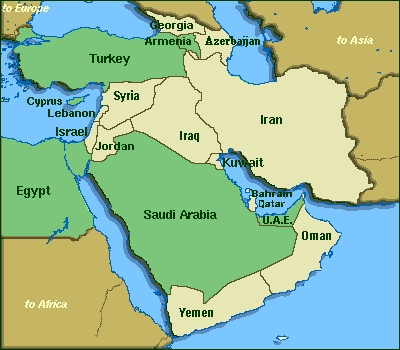Rethinking Middle East Strategies genre: Just Jihad & Polispeak & Six Degrees of Speculation
Update:
The following video is a great follow up to the original posting discussing our Middle East strategy. It is a good discussion between Pat Buchanan, Chris Matthews, and Bob Schrum in which they discuss the neoconservative strategy and whether their hawkish strategy is leading the United States into further conflicts.
Original Posting:

There are many opinions on the recent Israeli assaults on Hamas and Hezbollah in Gaza and Lebanon. The military actions were initiated in response to the killing and abduction of Israeli soldiers. Clearly Israel was provoked and one must question the motivations of those who engineered the abductions. At the same time, some have questioned the depth and degree of the retaliation especially with regard to the assaults within Lebanon. The Nation has an interesting article that discusses the rationale and the ramifications of the current conflict here.
It makes no sense for Israel to destroy the civil infrastructure of the Palestinians and of Lebanon in response to the kidnapping of its soldiers, or to further weaken the capacity of the governments of Lebanon and the Palestinian Authority while at the same trying to hold them accountable for the actions of groups and militias they cannot reasonably control. This collective punishment of the Palestinian and Lebanese people is not only inhumane and should be condemned but also leads to more radicalization and to more chaos.
As I've listened to an array of experts comment on the situation, I found the comments of Pat Buchanan, with whom I normally disagree, to be a reasonable assessment of the situation and an even better analysis of the failure of the Bush administrations efforts within the region. Buchanan, who has been accused of being anti-Semitic, actually has a coherent position worthy of consideration. Buchanan has made the distinction that he is a "traditional conservative" as opposed to a "neoconservative", the term given to many within the Bush administration who frequently support the use of that military intervention.
He has argued that Israel has the right to exist and to defend its security but he also believes that the Middle East would have fewer problems if and when the Palestinians were in fact given an independent state. With regards to the "war on terror" his position can be distinguished from the Bush administration by his belief that terrorists hate America for what we do, not what we are. The Bush administration has chosen to assert that terrorists are opposed to the freedoms that America and democracy represent and support. The distinction is essential to understanding Buchanan's criticism of U.S. foreign policy, whereby he contends our propensity to meddle in the affairs of other nations and regions fosters the negative feelings that have led to the development of an expanding anti-American sentiment.
With regard to the current situation, Buchanan and The Nation agree on a number of points.
The big beneficiaries of American policy have been the more radical wings of Hamas and Hezbollah and the Iranians, who more and more look like the champions of the Palestinian people. The big losers are the so-called moderate Arab regimes, which again look helpless in the face of what is seen as Israeli aggression, and the moderate Israelis, Palestinians and Lebanese who hoped for some normalcy of life with the prospect of peace, especially when the Hamas leadership appeared to be moving toward recognition of Israel. The United States and the larger world, too, are losers, for no one benefits from this mindless escalation of violence, particularly at a time of growing sectarian violence in Iraq and rising oil prices.
The events of the past two weeks should remind us that the peace and stability of the region is too important to be left to Israel and to Washington. There is a need for much greater and more forceful UN and European Union involvement and for the kind of diplomacy that the Europeans and the UN conducted in the late 1980s and the early '90s that led to the mutual release of prisoners and eventually to the Oslo peace process. The UN Quartet--consisting of the UN, the United States, Russia and the EU--has been far too deferential to the Bush Administration's failed road map strategy, and it is time for more active and comprehensive G-8 and UN-led diplomacy.
Until the United States and those who seek to shape the outcome in the Middle East realize that recent efforts have simply served to further radicalize the mindset of the people in the region, there will be increased tensions, violence, and instability. The fact that both Hamas and Hezbollah have been democratically voted into the respective political structures of the Palestinian Authority and Lebanon are clear signs that the current approach has only expanded the anti-Israeli and, by association, anti-American sentiment.
The U.S., in shifting its Middle East strategy since the Bush administration was elected, has lost its standing as an impartial broker of peace and stability within the region. The horrific events of 9/11 should have provided the United States with the moral authority to demand and dictate resolutions within the region. Instead, the neoconservative mentality has served to undermine our ability to bring peace to the region and has led to the further radicalization of its occupants.
Post a comment